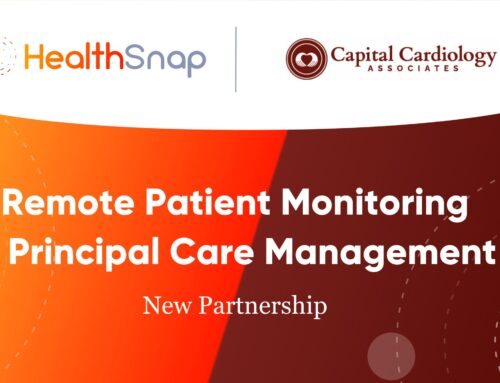Chronic Care Management (CCM) is a subset of virtual care management focused on providing comprehensive care for patients with chronic conditions to improve their health outcomes, enhance their quality of life, and reduce healthcare costs. With the rising prevalence of chronic diseases nationwide, CCM has become an essential component of modern healthcare.
What is Chronic Care Management?
The Centers for Medicare & Medicaid Services (CMS) defines Chronic Care Management (CCM) as “care coordination services done outside of the regular office visit for patients with two or more chronic conditions expected to last at least 12 months or until the death of the patient, and that place the patient at significant risk of death, acute exacerbation/decompensation, or functional decline.”
In simpler terms, Chronic Care Management is a dedicated healthcare approach that involves the continuous and proactive management of chronic conditions by healthcare providers, aiming to improve patient outcomes, enhance patient satisfaction, and reduce healthcare costs.
Prevalence of Chronic Conditions
Chronic conditions, such as diabetes, hypertension, heart disease, chronic respiratory diseases, and mental health disorders, are prevalent worldwide. According to the World Health Organization (WHO), chronic diseases are the leading cause of mortality globally, accounting for approximately 60% of all deaths.
In the United States:
-
About 60% of adults have at least one chronic condition.
-
Approximately 40% of adults have two or more chronic conditions.
-
Nearly half of the population over 75 years of age have three or more chronic conditions.
Given the high prevalence and impact of chronic diseases, effective management and coordination of care are essential to improving patient outcomes and reducing the burden on the healthcare system.

Qualifying Diagnoses for CCM Services
Chronic Care Management (CCM) is structured to assist individuals that are managing two or more chronic conditions that demand consistent care. It’s noteworthy that approximately 75% of Medicare beneficiaries fit this criterion. While the specific diagnoses can vary based on different healthcare guidelines and settings, some common examples of chronic conditions typically included in CCM programs may include:
-
Diabetes: Both type 1 and type 2 diabetes are frequently addressed within CCM programs. These conditions necessitate continual monitoring of blood glucose levels, medication oversight, lifestyle adjustments, and proactive care to avert potential complications.
-
Hypertension (High Blood Pressure): High blood pressure is a persistent condition that often demands ongoing management. Chronic Care Management aids individuals with hypertension by facilitating regular blood pressure checks, modifying medications when necessary, and promoting lifestyle changes to sustain healthy blood pressure readings.
-
Congestive Heart Failure (CHF): CHF is a cardiac ailment characterized by the heart’s inability to pump blood efficiently, leading to fluid accumulation in the lungs and extremities. This can manifest various symptoms like chest discomfort, edema, palpitations, and weight fluctuations. Managing CHF necessitates continuous treatment, medication usage, and consistent care oversight.
-
Chronic Obstructive Pulmonary Disease (COPD): COPD encompasses chronic lung conditions such as chronic bronchitis and emphysema. CCM supports individuals with COPD by aiding in symptom management, optimizing medication usage, offering assistance for smoking cessation, and organizing pulmonary rehabilitation services.
-
Asthma: Asthma is a persistent respiratory condition that demands regular management and oversight. CCM can assist asthma patients by helping them identify triggers, effectively manage medications, formulate an asthma action plan, and enhance self-care practices.
-
Chronic Kidney Disease (CKD): Patients with CKD need regular monitoring of kidney functionality, management of related conditions (like hypertension and diabetes), and dietary adjustments. CCM facilitates coordinated care and educates patients on strategies to decelerate CKD progression.
-
Mental Health: Certain mental health conditions, including depression and anxiety disorders, may be eligible for CCM. Integrated care approaches that cater to both physical and mental health facets offer comprehensive support for those with these conditions.
Integral Role of the Healthcare Team in Chronic Care Management
CCM billing requires oversight by a provider possessing a National Provider Identifier (NPI) number. However, a variety of licensed health care professionals are qualified to administer the program, including:
-
Physicians
-
Physician Assistants
-
Nurse Practitioners
-
Certified Nurse Midwives
-
Clinical Nurse Specialists
-
Pharmacists
Effective teamwork is vital in CCM, ensuring patient safety, optimal treatment outcomes, and minimizing adverse events due to miscommunication.

Core Care Team Responsibilities
The foundational Chronic Care Management team delivers integrated care to the patient. Composed of professionals such as doctors, nurses, medical assistants, and care navigators, this team provides comprehensive primary care appropriate to the patient’s condition. For instance, for a patient diagnosed with diabetes, the care core team may monitor blood sugar levels, adjust medication as required, educate the patient and their family about the condition and necessary lifestyle modifications
The core team may craft a care plan encompassing regular health monitoring of the patient, educating the family about the condition and providing lifestyle management support, and establishing a network of resources to ensure the patient accesses the appropriate care. Moreover, the core care team may serve as the primary contact point for both patients and their families.
Coordinating Team’s Responsibilities
The coordinating team liaises with various professionals to ensure the patient receives optimal care. This team includes specialists. For example, a cardiologist might be consulted for managing a heart condition, while an endocrinologist may oversee diabetes management. Based on their expertise, individualized plans are devised to meet the patient’s specific needs. The team collaborates with other healthcare providers to ensure consistent Chronic Care Management.
Contingency Teams’ Responsibilities
Contingency teams are important in CCM, furnishing additional support and resources to those grappling with chronic conditions. They offer education and counseling on medical management, nutrition, and other health-related subjects. These teams coordinate care among providers, bridge communication gaps between patients and their healthcare team, and provide vital mental health support to manage the emotional toll of living with a chronic illness. By offering these services, contingency teams alleviate the burden of chronic illness and associated risk factors for patients, caregivers, and their families.
Ancillary Team’s Responsibilities
The ancillary teams bolster the core medical services and are vital to the seamless functioning of a healthcare facility. They offer administrative, technical, and logistical support, collaborating with medical professionals to ensure the facility operates efficiently. Responsibilities of the ancillary team encompass hygiene maintenance, transportation arrangements, electronic health record (EHR) handling, assisting with paperwork for Medicare patients, supporting annual wellness visits, and providing other essential services such as food services, facilities management, security, and volunteer coordination.
CPT Codes for CCM
Billing for Chronic Care Management involves the use of specific Current Procedural Terminology (CPT) codes. The primary CPT code for CCM is 99490, which covers a minimum of 20 minutes of non-face-to-face care coordination and management services each month. This includes tasks like developing care plans, communicating with other healthcare providers involved in the patient’s care, medication management, and ensuring 24/7 access to care.
Beyond the 99490 code, there are additional CPT codes available to bill for extended time or more complicated cases:
99487: Covers 60 minutes of service.
99489: An add-on code for an extra 30 minutes beyond the initial 20 minutes of 99490.
There are also Principal Care Management (PCM) Codes related to CCM:
99424: This code pertains to principal care management services for a single high-risk chronic condition that lasts at least 3 months. It involves complex care needs, frequent medication adjustments, and coordination among practitioners. The initial 30 minutes of care each month must be provided by a qualified healthcare professional.
99425: This code covers additional principal care management services for a high-risk chronic condition lasting at least 3 months, including complex care planning, medication adjustments, and ongoing coordination. Each extra 30 minutes per month needs to be provided by a qualified healthcare professional.
99426: Initial principal care management services for a high-risk chronic condition lasting at least 3 months, including complex care planning and medication adjustments. The first 30 minutes of clinical staff time per month must be directed by a qualified healthcare professional.
99427: Additional principal care management services for a high-risk chronic condition lasting at least 3 months. Each extra 30 minutes of clinical staff time per month must be directed by a qualified healthcare professional.
99437: Additional CCM services for patients with multiple chronic conditions lasting at least 12 months. This includes comprehensive care planning and monitoring. Each extra 30 minutes per month must be provided by a qualified healthcare professional.
99439: Each additional 20 minutes of clinical staff time directed by a physician or other qualified healthcare professional for chronic care management, per month.
99487: Initial complex chronic care management services for patients with multiple chronic conditions lasting at least 12 months. It involves comprehensive care planning and moderate or high-complexity medical decision-making. The first 60 minutes of clinical staff time per month must be directed by a qualified healthcare professional.
99489: Additional complex chronic care management services for patients with multiple chronic conditions lasting at least 12 months. Each extra 30 minutes of clinical staff time per month must be directed by a qualified healthcare professional.
99490: Initial CCM services for patients with multiple chronic conditions lasting at least 12 months. The first 20 minutes of clinical staff time per month must be directed by a qualified healthcare professional.
99491: CCM services provided by a qualified healthcare professional for patients with multiple chronic conditions lasting at least 12 months. It requires a comprehensive care plan and at least 30 minutes of professional time per month.
The billing provider should stay informed about the coding guidelines and requirements provided by the CMS and other payers to ensure they bill accurately and receive proper reimbursement for chronic care management services.
Advantages of Chronic Care Management for Healthcare Providers
When healthcare practices provide Chronic Care Management services, it can bring about numerous advantages, from improved patient outcomes to diversification of revenue streams.
Enhanced Patient Engagement and Satisfaction
Chronic Care Management encourages proactive patient engagement by promoting regular communication and follow-up between healthcare providers and patients. This continuous engagement helps build trust, encourages adherence to treatment plans, and fosters a collaborative approach to care.
Patients benefit from more personalized care plans, medication management, and ongoing access to care, leading to improved satisfaction and better health outcomes. Satisfied patients are more likely to adhere to their treatment regimens, reducing hospital readmissions and emergency department visits.
Improved Patient Outcomes
Through ongoing support and management for chronic conditions, CCM programs may contribute to significant improvements in patient outcomes. Regular monitoring, timely interventions, and comprehensive care plans and support can help stabilize chronic conditions, prevent complications, and enhance overall quality of life for patients.
Streamlined Care Coordination
Chronic Care Management programs may facilitate better communication and coordination among healthcare providers involved in a patient’s care. A multidisciplinary approach involving physicians, nurses, care navigators and other healthcare professionals ensures that patients receive comprehensive and cohesive care.
The core, coordinating, contingency, and ancillary teams collaborate to develop personalized care plans, manage medications, coordinate referrals, and provide patient education. This integrated approach reduces the fragmentation of care, minimizes medical errors, and optimizes the use of healthcare resources.
Reduction in Hospital Admissions and Readmissions
Effective Chronic Care Management programs can significantly reduce hospital admissions and readmissions by preventing disease exacerbations, managing complications, and promoting preventive care. By providing timely interventions and ongoing monitoring of chronic health conditions, CCM programs may help stabilize chronic conditions and address potential issues before they escalate, which may contribute to a decrease in hospitalizations and associated healthcare costs.
Efficient Use of Healthcare Resources
CCM emphasizes proactive management and preventive care, which can lead to a more efficient utilization of healthcare resources. By focusing on early detection and intervention, CCM can reduce the need for costly and intensive interventions, such as hospitalizations, surgeries, and emergency department visits.
Compliance with Regulatory Requirements
Adopting CCM can help healthcare providers comply with regulatory requirements and standards, such as those set by the Centers for Medicare and Medicaid Services (CMS). Providers can ensure accurate billing, documentation, and reporting of CCM services, thereby avoiding penalties and maintaining compliance with healthcare regulations.
Enhanced Professional Satisfaction and Job Fulfillment
Effective chronic care management can lead to enhanced professional satisfaction and job fulfillment among healthcare providers. By witnessing the positive impact of their coordinated efforts on patient outcomes and quality of life, providers may experience increased job satisfaction, reduced burnout, and a renewed sense of purpose in their profession.
Diversify Revenue Streams
An additional advantage of implementing Chronic Care Management is the potential for diversification of revenue streams through Medicare reimbursements. Providers bill for CCM services using specific Current Procedural Terminology (CPT) codes, such as 99490, 99487, and 99489, among others. These codes allow healthcare providers to receive reimbursement for non-face-to-face care coordination and management services provided to patients with chronic conditions.
Moreover, as healthcare systems transition to value-based care models, Chronic Care Management programs can help providers meet quality metrics and earn incentives for delivering high-quality, coordinated care to patients.
Key Elements of Chronic Care Management

Structured Recording of Patient Information
-
Demographics: Recording the patient’s demographics, including age, gender, and contact information.
-
Problem List: Documenting the patient’s chronic conditions, including diagnoses, symptoms, and complications.
-
Medications and Allergies: Maintaining a comprehensive list of the patient’s medications, dosages, and allergies to prevent potential drug interactions and adverse reactions.
Comprehensive Care Plan
-
Personalized Care Plan: Developing a person-centered care plan based on the patient’s health issues, focusing on the management and treatment of their chronic conditions.
-
Treatment Goals: Establishing measurable treatment goals to monitor the patient’s progress and adjust the care plan as needed.
-
Medication Management: Monitoring the patient’s medication regimen to assess adherence, potential interactions, and self-management.
Access to Care and Continuity of Care
-
24/7 Access to Care: Providing patients with around-the-clock access to healthcare professionals to address urgent needs and ensure timely guidance and support.
-
Continuity of Care: Ensuring seamless transitions between healthcare providers and settings, coordinating referrals to specialists, and conducting appropriate follow-ups after hospitalizations or emergency department visits.
Comprehensive Care Management
-
Preventive Care Services: Providing timely preventive care services, including screenings, vaccinations, and health assessments to prevent complications and improve health outcomes.
-
Psychosocial and Functional Needs: Addressing the patient’s psychosocial needs, functional deficits, and lifestyle factors that influence their health and access to healthcare.
Enhanced Communication Opportunities
-
Patient and Caregiver Communication: Offering opportunities for patients and caregivers to communicate with healthcare providers through secure messaging, internet, or other asynchronous non-face-to-face consultation methods.
-
Interprofessional Communication: Facilitating communication and collaboration among healthcare team members, including physicians, nurses, pharmacists, and other healthcare professionals involved in the patient’s care.
Medical Decision-Making
-
Complex Care Management: Providing medical decision-making of “moderate to high complexity” to address the patient’s chronic conditions effectively and ensure optimal health outcomes.
How to Bill for Chronic Care Management Services?
Prerequisites to billing for Chronic Care Management include enrolling eligible patients, gaining patient consent, incorporating a comprehensive care plan, and including remote CCM services each month. When billing for CCM, it is important for the Care Team to:
-
Track Time: Maintain accurate records of the time spent providing non-face-to-face care coordination services.
-
Use Proper Codes: Use designated CPT codes for CCM services, such as CPT 99490, CPT 99491, CPT 99487, CPT 99489, and G0511.
-
Maintain Documentation: Document all CCM services, including time logs, care plan changes, communication with other care providers, and patient or caregiver communication.
-
Submit Claims: Submit the claim to Medicare, ensuring it includes the appropriate CCM CPT code(s), patient information, and service date.
-
Monitor for Denials and Adjustments: Keep an eye on any denials or requests for additional information from the payer and address any issues promptly to ensure payment.
-
Stay Updated: Stay informed about any alterations in CCM billing requirements or reimbursement rates.
How to Get Started with a CCM Program?
It is important to efficiently manage your CCM workflow in order to meet eligible patients’ monthly Chronic Care Management (CCM) requirements. The following steps will help to start and maintain a CCM program:
-
Identify Eligible Patients: Confirm their eligibility and verify their Medicare insurance.
-
Update the Eligible Patient List Periodically: Regularly review and maintain the list to account for new enrollees and those no longer eligible.
-
Educate Patients: Inform eligible patients about how CCM can assist them in better managing their health conditions and improving their quality of life.
-
Secure Patient Consent: Obtain explicit verbal or written consent from patients and complete the enrollment process.
-
Engage in Monthly Conversations: Ensure a minimum of 20 minutes of meaningful interaction with each enrolled patient every month to discuss and manage their health needs.
-
Assist with Individual Patient Needs: Be proactive in addressing any healthcare-related concerns or needs the patient may express.
-
Address Social Determinants of Health (SDOH): Recognize and address factors like living conditions, economic stability, and social context, which can influence patients’ health and access to healthcare.
-
File Claims Efficiently: Submit billing information timely and accurately to ensure proper reimbursement.
-
Ensure Quality and Compliance: Regularly monitor the quality of care provided and ensure your program complies with relevant regulations and standards.
Choose HealthSnap for Comprehensive Chronic Care Management
Chronic Care Management offers consistent health and wellness support, improved access to relevant medical services, and a decreased reliance on emergency care for patients living with multiple chronic conditions. For healthcare providers, CCM fosters enhanced care coordination, a more proactive approach to care, increased patient satisfaction, and a chance to augment revenue streams. With the CMS reinforcing its commitment to CCM by broadening reimbursements, there is currently an excellent opportunity to initiate or expand a chronic care management program.
To learn more about HealthSnap‘s comprehensive virtual care management platform and how we are partnering healthcare organizations to deliver integrated RPM & CCM programs, please call 888-780-1872 or contact us online to schedule a consultation or a demo with one our specialists.











